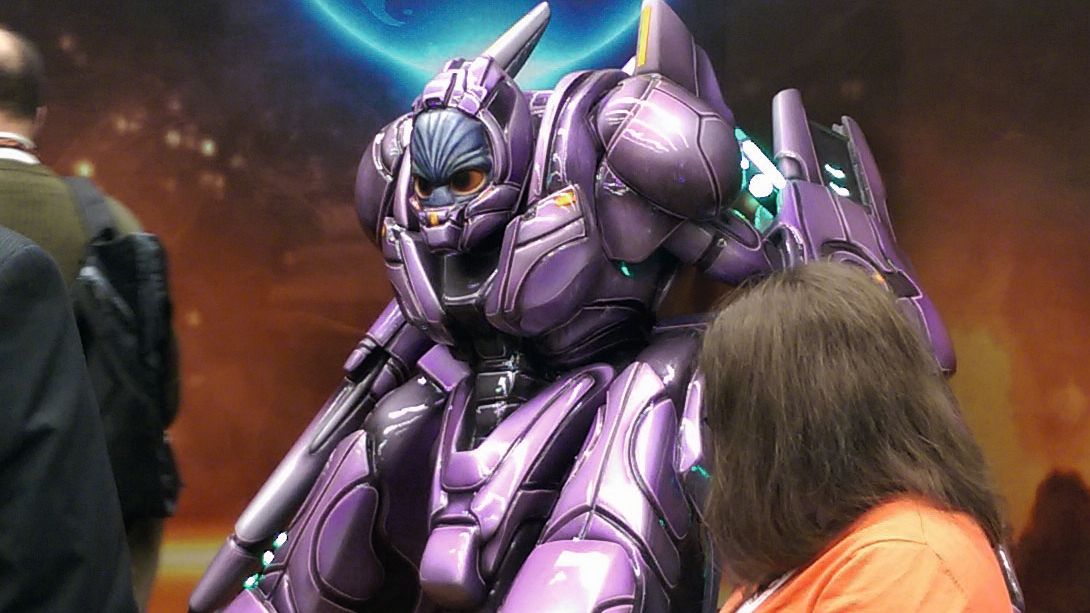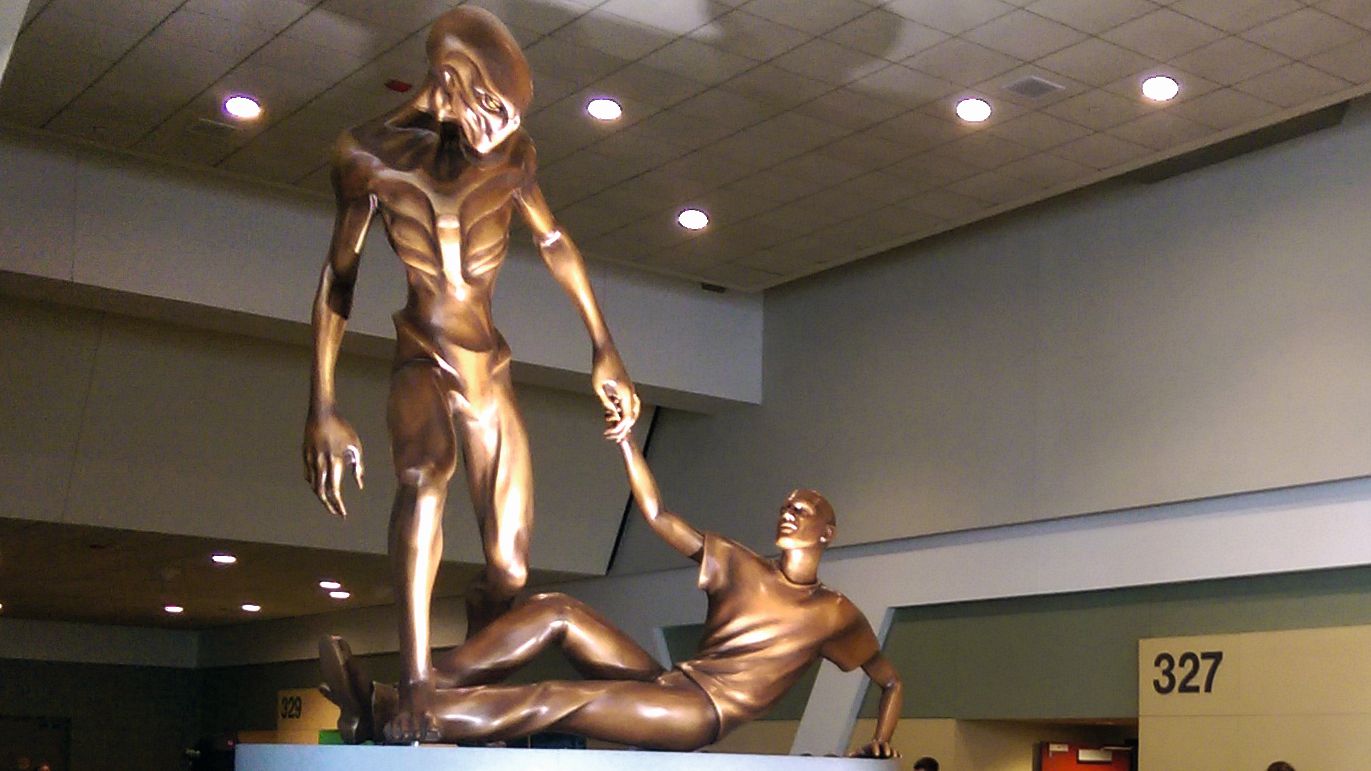Firaxis meets its fans: XCOM, board games, and collaborative design

Firaxicon isn't like other fan events. It's smaller and more intimate than Quakecon, Blizzcon or the Paradox convention. In attendance: over 300 fans, around 100 Firaxis employees and just a handful of journalists—most of them German. Firaxicon isn't built around big announcements. It's tailored for the Firaxis community, letting them get to know the people who make the games they love. It's the studio's earnest attempt to interact with its audience.
This year, the event is held in a corner of the top floor of the Baltimore Convention Center. To reach it, I have to walk past two floors of the fitness conference that has consumed the majority of the building. Throughout the space, lean, healthy looking people are lunging aggressively in a rainbow assortment of lycra. I start to worry that someone will ask if I've self-actualised my full mental, physical and emotional potential. Then, suddenly, nerds. There's a statue of a man reaching out his hand to the alien towering above him. Around it, Firaxis fans mill about—unsure of what to expect. I have found my people.
The majority of Firaxicon exists across a single corridor. There's a shop selling an assortment of XCOM and Civilization merchandise, and a room full of PCs on which to play Civilization: Beyond Earth's Rising Tide expansion. So far, so traditional. It's the other two rooms that capture the spirit of Firaxicon. In one, there's a 'museum'. It's filled with memorabilia from throughout the studio's history. Concept art covers the walls, and a video screen plays a looping feed of Sid Meier's old interviews and talks. In the corner, a statue of a Mechtoid from Enemy Within looms over the crowds.
Opposite the museum is the board game room. It's not just an opportunity to show off XCOM: The Board Game, although that does occupy the majority of tables. Throughout the day the room is filled with both fans and Firaxis employees. It performs an important social function—creating a space where attendees can come together to collaborate and compete as peers. It's heartening to see, and gives Firaxicon a feeling unlike any convention I've attended. As fan-driven as Eve Fanfest is, for example, there remains a noticeable divide between developer and consumer.

"I think we’ve always had an interesting connection with our players and our fans," Sid Meier tells me. "The games that we make seem to inspire a little bit of fanaticism and commitment to playing, and a lot of the ideas that we put into our Civ games come from our community. There’s a lot of interaction online between our designers and the community, and with modding they’ve contributed a lot to the success of Firaxis. [Firaxicon] is a way of meeting those people, and giving them a little more behind the scenes information."
The most traditional aspect of Firaxicon is the panels, but even they manage to skew expectation. Jake Solomon leads the most conventional: a preview of the upcoming XCOM 2, complete with an exclusive viewing of its intro cinematic, a reveal of new aliens and a detailed breakdown of Firaxis' planned modding support. There's an informal and jovial atmosphere, and the audience are tangibly excited by what they're shown.
The other panels take a more unusual approach. What was advertised as a retrospective on Civilization: Beyond Earth instead takes the form of an interactive brainstorming session. Beyond Earth's lead designers, Will Miller and David McDonough, conceptualise a pre-civilisation Civilization with the audience's help. The ad-hoc creation of Dawn of Civilization, as it's named, shows us the process of creating new ideas within the series' set framework. At the end, Sid Meier comes on stage to bring the high concept back to reality—questioning some of the decisions made, and presenting possible pitfalls drawn from his decades of experience.
The biggest gaming news, reviews and hardware deals
Keep up to date with the most important stories and the best deals, as picked by the PC Gamer team.
Sid Meier comes on stage to bring the high concept back to reality—questioning some of the decisions made, and presenting possible pitfalls.
The pervading sense I get is that Firaxicon is designed for Firaxis as much for the fans. "Most of the people that work at Firaxis don’t get that opportunity very often," says Meier. "To understand that what we do is important to the people that play these games, and enjoy them and get satisfaction out of them. It adds a sense of why it’s important to get that game out on time, or why it’s important to fix that bug. If you don’t fix that bug, somebody’s going to experience that. They’re going to come up to you and say, 'hey!'"
"It was at Firaxicon last year that, for the first time, I really saw the kind of person I was when I was playing Civ," says David McDonough, explaining why the event is important to him. "A fan of Civ playing the game in that room. That was really a moment for me."
The day ends with Sid Meier and Bruce Shelley regaling the audience with stories from Microprose, and the creation of the original Civilization. Then there's a raffle, in which most of the numbers called aren't claimed—a casualty of a long day filled with not all that much to do. As the remaining fans leave the panel theatre, enthusiastic Firaxis employees stand with their arms outstretched for a drive-by high-five.
Later that night, I find myself in a grubby pizza joint—eating under the fixed cheerfulness of a Guy Fieri picture. Firaxicon was small and strange, but I miss its sincerity. Firaxis, I think, is winning the culture victory.

Phil has been writing for PC Gamer for nearly a decade, starting out as a freelance writer covering everything from free games to MMOs. He eventually joined full-time as a news writer, before moving to the magazine to review immersive sims, RPGs and Hitman games. Now he leads PC Gamer's UK team, but still sometimes finds the time to write about his ongoing obsessions with Destiny 2, GTA Online and Apex Legends. When he's not levelling up battle passes, he's checking out the latest tactics game or dipping back into Guild Wars 2. He's largely responsible for the whole Tub Geralt thing, but still isn't sorry.

